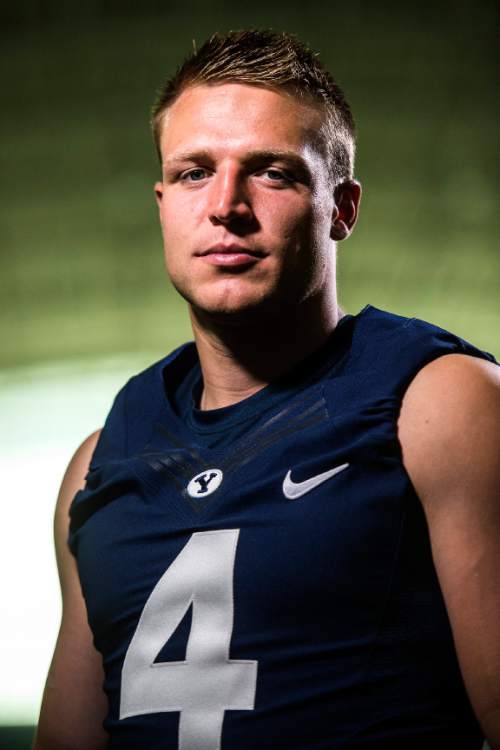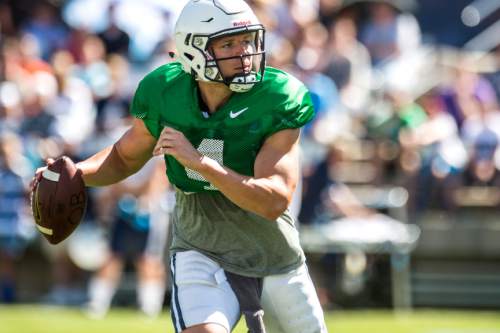This is an archived article that was published on sltrib.com in 2015, and information in the article may be outdated. It is provided only for personal research purposes and may not be reprinted.
It will end one day because … it always does.
Taysom Hill's Lisfranc injury, damage to his foot that appears to have extinguished the senior quarterback's season and maybe his college career at BYU, is sad punctuation to an incomplete sentence. Had he, such an extraordinary athlete, stayed healthy, what a glorious sentence he might have written.
But that's just in football.
There's so much more for him to write in life.
I thought about that while watching the video of his teammates hugging him and consoling him and crying with him in the postgame locker room at Nebraska, when and where they were torn by the forces of joy — of beating the Huskers on the last play of the game — and pain — of losing their quarterback, again, to some cockamamie injury, neither of those extremes wholly unfettered.
Football can be one cruel mother. Tethering oneself to it can be even crueler.
On Wednesday, news came of the death of Tyler Sash, the former Iowa Hawkeye and New York Giant, who passed away in his home in Iowa at the age of 27, having been cut by the Giants and looking for new purposes for living now that football was done. At this writing, autopsies had not yet determined the cause of Sash's death, but some of his former teammates wish they could have helped.
"[There was] some mental instability at the end where he figured that it was easier to just end it, which is … it's tough," Giants linebacker Mark Herzlich told reporters. "And you never think it's gonna get to that. … There's life after football, but it's not the same. And you realize that with what happened with Tyler."
Jeff Woody, a former Iowa State running back, who assumed the worst, or at least the painfully tragic, in Sash's death, wrote in a moving blog post the importance for athletes to see themselves as more than athletes and to embrace a more comprehensive view of their reason for being. His piece was republished in The Des Moines Register.
"If I identify myself as an athlete and the sport is taken away from me, I am no longer me," he wrote. "I am no longer worthy to be myself. I have a hole where I used to be."
Woody pointed at the attention athletes get and the way that attention and expectation seeps into their souls, how it saturates them and, ultimately, defines them:
"What we as athletes take note of is how important everyone else sees us when we are in that role. That role then starts to take full shape within our minds. We start to think that we are valued most as an athlete. We are cared for most when we put on that uniform. We are exalted for what we do within the confines of those white boundaries. Slowly, we start to look at ourselves the same way. We are important. On the field. We are loved. On the field. We are cared for. On the field. We are valuable to society. On the field. We are athletes. We are what you say we are. That is me. I am an athlete. Until I'm not. … You see, when the game is taken away and we can no longer be counted on to do all of the things we have been told we are valuable for, we are lost."
Woody said, in his case, his wife, Hannah, helped him find his way out of the tunnel that had led him toward tying most of his self-worth to football, and to suffering when football was over.
"I was told what I'm worth," he said. "I just wish I was able to talk to Tyler now to tell him what he was as Tyler. My plea is that in the next encounter with an athlete of any level, ask them about their sport, sure. But ask them about what makes them who they are beyond sports. The next time you think about cussing at a quarterback because he threw a bad pass, remember what you are telling them."
Most of us love football, love other sports, too, that's why we were drawn to it, to them, from the start. But it's not everything. It's not even the most important thing. Not even for the people who play it. It shouldn't be.
I don't know exactly what led to Tyler Sash's demise. But a lot of athletes, human beings who played a sport, have told me how difficult it was for them to disengage from that sport when the time came. And it always does. A former NFL player whose body hurts him every day when he gets out of bed, to the point of acute pain, said he would do it over again, without a doubt. Football did more than make him a rich man. It enriched his life's experience.
Now, he's seeking further enrichment in other pursuits, even as he hurts.
Perhaps Taysom Hill will play football again. Perhaps he won't.
Either way, he's got a mountain of things for which to live, a great future. And he knows that. But if there are others who struggle in the absence of their game, who, at the high school or college or professional levels, are no longer themselves, who see a hole where they used to be, who no longer remember who they are, maybe we should remind them.
GORDON MONSON hosts "The Big Show" with Spence Checketts weekdays from 3-7 p.m. on 97.5 FM and 1280 AM The Zone. Twitter: @GordonMonson.





